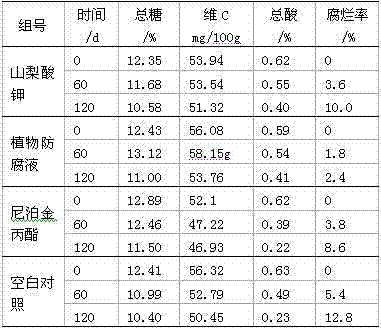Compound navel orange preservative prepared from plant extract
A preservative and plant-derived technology, applied in food science, food preservation, fruit and vegetable preservation, etc., can solve the problems of difficult research on the production process of antagonistic bacteria, high cost, poor broad-spectrum, etc., to reduce decay rate and weight loss The effect of high efficiency, maintaining good quality and prolonging the storage time
- Summary
- Abstract
- Description
- Claims
- Application Information
AI Technical Summary
Problems solved by technology
Method used
Image
Examples
Embodiment 1
[0034] Based on 1kg compound navel orange preservative:
[0035] Dried magnolia officinalis and clove powder were passed through a 20-mesh sieve, added to 70% ethanol at a material-to-liquid ratio of 1:20, soaked at 50-60°C for 3 hours, and then ultrasonically extracted for 20 minutes. Centrifuge at 1000r / min for 5min, discard the precipitate, and retain the extract.
[0036] The thickener is Tween 80 and xanthan gum, and the ratio of Tween 80 to xanthan gum is 2:1.
[0037] The specific formula of each component is as follows:
[0038] Magnolia officinalis 100g
[0039] Cloves 300g
[0040] Potassium sorbate 100g
[0041] Propylparaben 100g
[0042] Citric acid 20g
[0043] Tween 80 14g
[0044] Xanthan gum 7g
[0045] Add water to 1kg.
Embodiment 2
[0047] Based on 1kg compound navel orange preservative:
[0048] Dried magnolia officinalis and clove powder were passed through a 20-mesh sieve, added to 70% ethanol at a material-to-liquid ratio of 1:20, soaked at 50-60°C for 3 hours, and then ultrasonically extracted for 20 minutes. Centrifuge at 1000r / min for 5min, discard the precipitate, and retain the extract.
[0049] The thickener is Tween 80 and xanthan gum, and the ratio of Tween 80 to xanthan gum is 2:1.
[0050] The specific formula of each component is as follows:
[0051] Magnolia officinalis 150g
[0052] Cloves 250g
[0053] Potassium sorbate 150g
[0054] Propylparaben 150g
[0055] Citric acid 30g
[0056]Tween 80 20g
[0057] Xanthan gum 10g
[0058] Add water to 1kg.
Embodiment 3
[0060] Based on 1kg compound navel orange preservative:
[0061] Dried magnolia officinalis and clove powder were passed through a 20-mesh sieve, added to 70% ethanol at a material-to-liquid ratio of 1:20, soaked at 50-60°C for 3 hours, and then ultrasonically extracted for 20 minutes. Centrifuge at 1000r / min for 5min, discard the precipitate, and retain the extract.
[0062] The thickener is Tween 80.
[0063] The specific formula of each component is as follows:
[0064] Magnolia officinalis 100g
[0065] Cloves 300g
[0066] Potassium sorbate 200g
[0067] Propylparaben 200g
[0068] Citric acid 40g
[0069] Tween 80 30g
[0070] Add water to 1kg.
PUM
 Login to View More
Login to View More Abstract
Description
Claims
Application Information
 Login to View More
Login to View More - R&D
- Intellectual Property
- Life Sciences
- Materials
- Tech Scout
- Unparalleled Data Quality
- Higher Quality Content
- 60% Fewer Hallucinations
Browse by: Latest US Patents, China's latest patents, Technical Efficacy Thesaurus, Application Domain, Technology Topic, Popular Technical Reports.
© 2025 PatSnap. All rights reserved.Legal|Privacy policy|Modern Slavery Act Transparency Statement|Sitemap|About US| Contact US: help@patsnap.com

